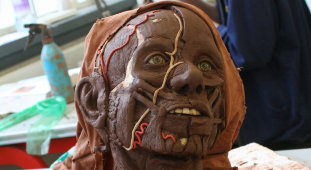Dundee expands world-leading forensic & medical art offering
Published On Tue 10 Mar 2015 by Roddy Isles

The University of Dundee’s world-renowned expertise in forensic and medical art is being further developed with the creation of a range of pioneering new courses.
The University was the first in the world to offer courses in forensic and medical art in 2007 in a collaboration between the Centre for Anatomy and Human Identification and Duncan of Jordanstone College of Art & Design.
Since then the work of the Dundee academics has gained worldwide attention for a range of projects, including the facial reconstruction of figures such as Richard III, Johann Sebastian Bach and Robert Burns.
Dundee’s expertise has also been deployed in criminal cases around the world, utilising forensic art techniques to aid identification of both suspects and victims that have been crucial in securing convictions or tracing missing persons.
Now the University is remodelling its own offering with the provision of updated Masters courses in Forensic Art & Facial Identification and Medical Art. It is also offering a new Postgraduate Certificate, ‘Anatomy for artists’, aimed at students from an art background wishing to improve their understanding of anatomy. Students will study anatomy from cadavers and prosecutions along with life drawing, facial anatomy sculpture and anatomical illustration.
“We are already one of the world’s leading centres for education in the field of forensic and medical art,” said Caroline Erolin, course co-ordinator for the MSc in Medical Art. “We continue to welcome students from around the world.
“What we are offering them now is an updated and refreshed set of courses, taking into account the latest developments in technology which are impacting on the field, which will help us maintain our international position.”
Forensic art encompasses a wide range of subjects, notably facial anthropology and identification, such as two- and three-dimensional facial reconstruction, craniofacial superimposition, post-mortem depiction, composite art and age progression.
Medical art encompasses a wide range of applications from patient communication and information to medical teaching and training. It is also used by the pharmaceutical industry to aid in explanation of their products and by television companies in the production of documentaries.
Both of the highly innovative one-year taught Masters course employ highly specialised tutors from scientific backgrounds alongside experienced forensic art and medical art supervisors.
For media enquiries contact:
Roddy Isles
Head of Corporate Communications
University of Dundee
Nethergate, Dundee, DD1 4HN
Tel: +44 (0)1382 384910
Mobile: 07800 581902
Email: r.isles@dundee.ac.uk